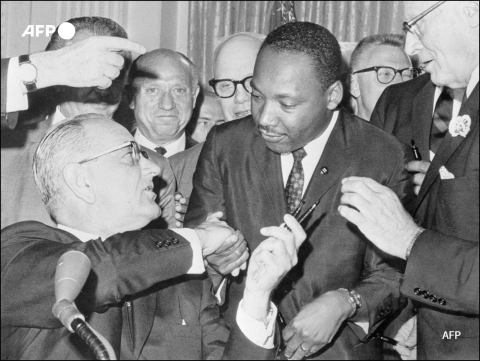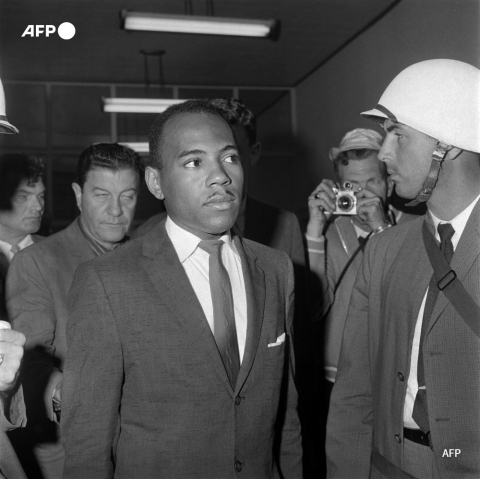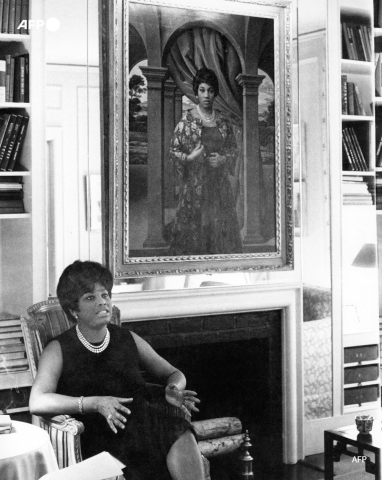Desegregation step by step

Here are a series of examples, drawn from AFP stories, of court rulings and other acts that illustrate the dismantling of racial segregation across US territory by the end of the 1960s.
The stories have been translated from French.
- Trains open to all -
WASHINGTON, October 17, 1960 (AFP) - Reverend Martin Luther King ... announced at a press conference following a meeting with President John F. Kennedy at the White House that the three major railway networks serving the south of the United States had decided to open all their waiting rooms, restaurants, buffets and other public spaces in their stations to travellers of all races.
- In schools -
NEW ORLEANS, Louisiana, December 4, 1960 (AFP) - A Methodist pastor who leads opposition to racial segregation in New Orleans schools has been booed by his parishioners.
Reverend William Foreman was the first father of a white family to send his daughter to a school which admitted blacks when integration started a week ago ... By the end of the week a dozen white children had followed the pastor's example.

ATLANTA, Georgia, February 19, 1961 (AFP) - A pastoral letter was read today in churches of the Catholic dioceses of Atlanta and Savannah in Georgia and Charleston in South Carolina calling on worshippers to be ready to open up Catholic schools to all children without racial discrimination.
- On buses -
WASHINGTON, September 23, 1961 (AFP) - The federal Interstate Commerce Commission has published a regulation banning from November 1 all racial segregation in buses serving more than one state and in railway and bus stations where these coaches stop.
The new regulation, which only applies to public transport the federal desegregation policy, has been prompted by the arrests of "freedom riders" in bus stations in several southern states, notably in Jackson, Mississippi where 306 riders have been arrested since May 24, 1961.
- The Washington-New York highway -
BALTIMORE, November 12, 1961 (AFP) - Supporters of racial integration in the United States have won a victory in the Baltimore region: most of the restaurants lining the road linking Washington and New York will from now on be open to black as well as white customers.
The presence of more and more African diplomats in the United States, who are expected to travel between Washington and New York, made racial discrimination in this region's restaurants even more sensitive.
The Second Secretary of Niger's embassy, C.C. Uchuno, reported on January 7, 1961 that a Charleston, Virginia restaurant had served his breakfast in a bag and asked him to have it outside.

- Mrs, Miss, Mr -
WASHINGTON, March 31, 1964 (AFP) - Blacks will have to be addressed as Mr, Mrs or Miss in court as are whites, the United States Supreme Court has ruled.
In southern states blacks are always called by their first name.
The decision by the Supreme Court followed an appeal by Miss Mary Hamilton, a secretary for the Congress of Racial Equality in Alabama, who had been convicted of contempt of court. She had refused to answer questions of the judge who insisted on calling her by her first name.
The Supreme Court overturned the conviction, saying it was a clear violation of the duty of states to ensure equality before the law to all its citizens.
- 'Respect' in shops -
GREENWOOD, Mississippi, April 29, 1968 (AFP) - White shopowners in Greenwood have promised to meet all black demands after a boycott that started April 11.
The boycott was followed 100 percent of the people in Greenwood, of which 45 percent of its 20,000 inhabitants are black ... The shopowners have promised to hire blacks and to treat all their customers with the same respect and courtesy.
- Housing for all -
MILWAUKEE, Wisconsin, May 1, 1968 (AFP) - A law banning all discrimination in the rental or sale of housing has been voted by the municipal council of Milwaukee, Wisconsin by 15 votes to four ... The vote is the culmination of a year-long fight and demonstrations by blacks in Milwaukee.
From August 1967 to March 1968 they organised daily demonstrations, parades, meetings to protest racial discrimination in housing.
Last August unrest erupted in the black neighbourhoods in the city, in which blacks make up 86,000 of a population of 800,000.
